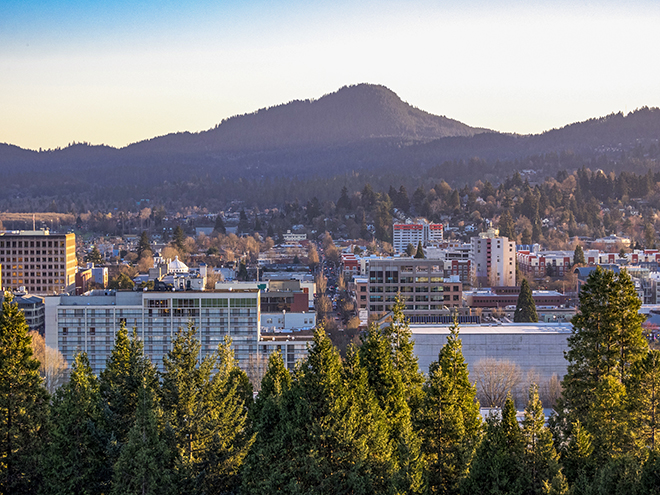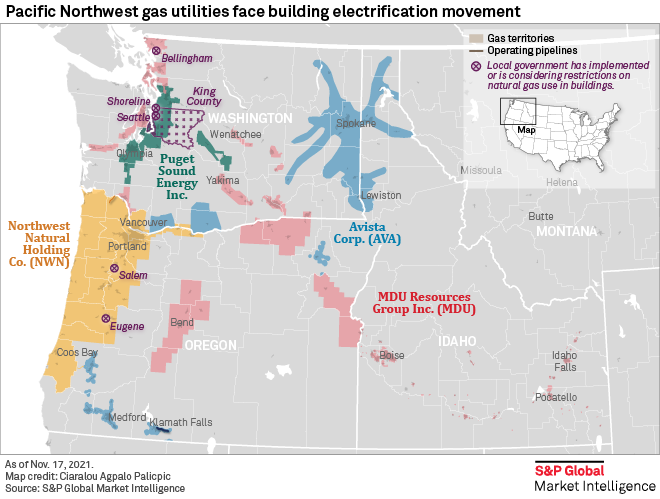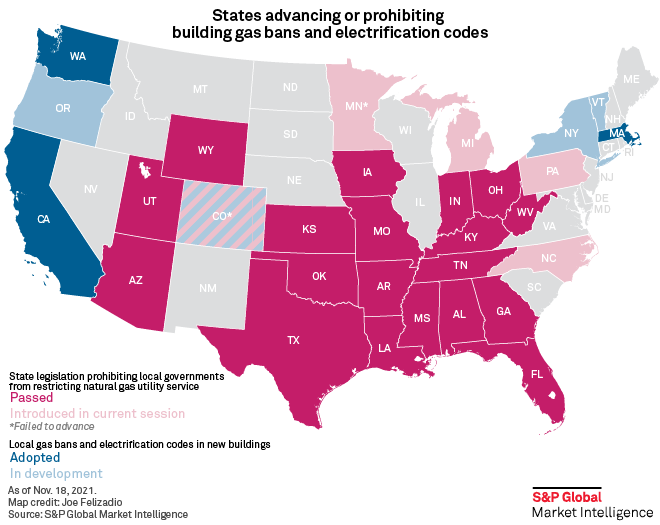S&P Global Offerings
Featured Topics
Featured Products
Events
S&P Global Offerings
Featured Topics
Featured Products
Events
S&P Global Offerings
Featured Topics
Featured Products
Events
Banking & Capital Markets
Economy & Finance
Energy Transition & Sustainability
Technology & Innovation
Podcasts & Newsletters
Banking & Capital Markets
Economy & Finance
Energy Transition & Sustainability
Technology & Innovation
Podcasts & Newsletters
S&P Global Offerings
Featured Topics
Featured Products
Events
19 Nov, 2021

|
Eugene, Ore., is one of several cities in the Pacific Northwest pursuing ordinances or incentives to transition buildings from natural gas to electric heating. |
The West Coast movement to transition buildings away from natural gas heating gathered steam as lawmakers in Eugene, Ore., moved toward developing an ordinance requiring new buildings to be all-electric.
The resolution makes Eugene the first Beaver State city to advance an electrification mandate for new buildings, a policy that about 50 local California governments and Seattle have adopted. Several Pacific Northwest counties and cities are considering restrictions on building gas use, and climate activists say Eugene could provide a model for other municipalities in Oregon.
"With the city of Eugene beginning to move forward and staff likely bringing back concrete policy options that they could pursue in line with our state's law, that will be a really big step forward for the entirety of the state," Dylan Plummer, a senior campaign representative for building electrification at Sierra Club, said.

The Nov. 17 vote marked a setback for Northwest Natural Holding Co., the gas utility operator for Eugene and western Oregon, which has sought to beat back building gas bans. In May, a franchise agreement between Eugene and Northwest Natural Gas Co., or NW Natural, a subsidiary of Northwest Natural Holding, lapsed amid a disagreement with Eugene over linking the franchise to the city's climate goals.
"We continue to believe that forced electrification is counter to reaching our shared climate goals in the fastest, most affordable, and reliable way possible," NW Natural said in an email. "We're confident that when the [Eugene City] Council analyzes the details around emissions, cost, and energy system resiliency, they will conclude the gas system is critical to an effective path to decarbonization."
Like many Pacific Northwest cities, Eugene is seeking to slash greenhouse gas emissions — it is targeting a roughly 64% reduction from 2010 levels by 2030 — and sees potential in the building sector. Energy used in buildings generates 32% of Eugene's greenhouse gas emissions, with natural gas combustion accounting for nearly 90% of the total, according to an analysis by city staff.
The city's climate action plan includes several proposed building decarbonization policies, including mandating home energy scores and commercial building benchmarking; investing in energy efficiency retrofits; and building electrification. Additionally, the plan proposed mandatory or opt-out carbon offset programs for ratepayers, a requirement to blend biogas and hydrogen into the gas grid, and restrictions on new gas infrastructure — all of which are on pause while Eugene and NW Natural continue franchise negotiations.
Eugene vote reflects regional momentum
City councilors initially considered putting forward a motion directing staff to develop an electrification ordinance. Instead, they directed the city manager to set up discussions on changing the city code to require all newly constructed residential and commercial buildings to be electric-only, starting in 2023. The motion, which ultimately also applied to industrial facilities, passed unanimously.
A second resolution, which passed 6-2, directed the city manager to develop a roadmap for decarbonizing Eugene's existing commercial and residential building stock by 2045. The resolution called for city staff to develop strategies for addressing rental housing and to consider low-income and historically marginalized households.
The second resolution sent a strong signal that Eugene is committed to decarbonizing its entire building stock, while the first stands to yield valuable research to other lawmakers seeking to navigate state laws preempting a city's ability to alter building codes, Plummer said.
Following the vote, Milwaukie, Ore., Mayor Mark Gamba tweeted, "Way to go Eugene. Let's see if Milwaukie can join you."
Another Oregon city, Salem, drafted a climate action plan whose major objective is increasing energy efficiency and electrification of all buildings, including through electric heat pump subsidies for existing buildings and an energy code that would require or incentivize all-electric construction. Climate plans with similar measures and attempts to pass building gas ban ordinances in other Pacific Northwest cities present policy risk for other gas utility operators including Avista Corp., MDU Resources Group Inc., and Puget Sound Energy Inc.

At the state level, the Oregon Public Utility Commission launched a proceeding to explore how Gov. Kate Brown's 2020 executive order directing state agencies to reduce and regulate greenhouse gas emissions will affect gas utilities and ratepayers. California, Washington, and several other states have launched similar proceedings to align gas system planning with climate goals.
The shift to electric heating raises critical questions about customer bill impacts, the depreciation of gas assets, and cities' ability to deliver heat. In Eugene, the natural gas system delivers more than 90% of peak heating load during very cold days, City Council Member Alan Zelenka noted during a Sept. 22 meeting. Zelenka also serves as assistant director for planning and innovation at the Oregon Department of Energy.
Stakeholder relationship deteriorates amid gas ban debate
NW Natural's experience in Eugene illustrates the challenge that gas utilities face in responding to building electrification proposals while maintaining constructive relationships with local lawmakers.
In May, NW Natural Chief Marketing Officer and Senior Vice President of Operations Kim Heiting told S&P Global Market Intelligence that local elected officials lacked energy literacy, and the company sought to educate them about the role of the gas system. Executives have also expressed that view in meetings with equity analysts. In a May research note following a meeting with NW Natural, Guggenheim Securities wrote "the company continues to work with stakeholders in somewhat hostile localities like Eugene to educate on the value of gas."
Council Member Claire Syrett said the insinuation that local lawmakers considered building electrification because they were ignorant was emblematic of NW Natural's attitude going back to a May 2019 meeting. "They were incredibly condescending to us, and in my view, spoke to us as if we were some backwoods country hayseeds, rather than approaching us with the respect of a city council that was working hard to understand what our residents need and what we could do around meeting our carbon reduction goals," she said in an interview.
In Syrett's view, NW Natural made no substantive attempt to educate lawmakers and instead responded to questions with a handful of talking points. Several council members also bristled at communications NW Natural sent to customers that suggested the council was seeking a wholesale ban on natural gas use, even though councilors had shelved consideration of narrower restrictions to pursue negotiations with NW Natural.
Those frustrations boiled over at a February meeting. Mayor Lucy Vinis — who sits on the U.S. Environmental Protection Agency's Local Government Advisory Committee and a Climate Mayors steering committee — said Eugene was at risk of becoming "a model that shows how a city is held hostage to a franchise agreement."
In response, NW Natural said it answered questions thoroughly and responded to misinformation clearly but respectfully. The company said it offered to meet with councilors several times to provide in-depth information.
"I believe this work requires a partnership approach, and that making important and innovative progress is not always easy," Heiting said in an email. "We remain committed to transparent and data-driven problem solving and solutions."
Delay leads to two-track approach in Eugene
In June, Eugene and NW Natural pivoted toward a franchise agreement that proposed the company make carbon reduction investments in coming years. However, with negotiations entering a third year, several councilors said it was time to also consider a new building electrification ordinance.
That included Zelenka, who initially championed the decision to pause work on more contentious policies and reach a mutually agreeable solution. "I've kind of run out of patience with that process, and I don't have confidence that we're going to get anywhere soon," Zelenka said.
NW Natural continues to build on traditional emissions reduction strategies like leak reduction and energy efficiency by adopting and blending natural gas alternatives into its distribution system. The company was instrumental in developing a nation-leading law that allows utilities to recoup costs of procuring and investing in renewable natural gas and low-carbon hydrogen. To date, the company has entered agreements to purchase or develop renewable natural gas resources equal to 3% of its annual sales volume in Oregon. It is also developing a green hydrogen pilot project.
The council expects to hold several work sessions to explore questions related to electrification, including impacts on ratepayers and regional electric power capacity. But some climate activists believe an electrification mandate is inevitable.
"The council has the votes to move forward an ordinance," Plummer said. "It's just a matter of time."
